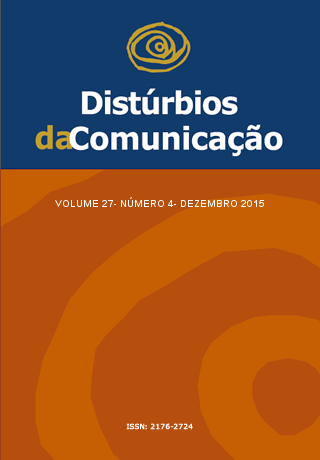Desconfortos, sinais e sintomas vocais em técnicos e preparadores físicos de futebol
Palavras-chave:
Voz, Fonoaudiologia, Futebol, Promoção da Saúde, Educação Física e Treinamento, Educação.Resumo
Objetivo: Comparar a presença de sinais e sintomas vocais e de desconfortos no trato vocal, autorreferidos, por Técnicos e Preparadores Físicos de futebol. Métodos: são sujeitos 13 Preparadores Físicos (PF) e 13 Técnicos (T) de times da série A da primeira fase do Campeonato Paulista de Futebol 2012. Foram aplicados os instrumentos: Questionário de Sinais e Sintomas Vocais (QSSV) e Escala de Desconforto no Trato Vocal (EDTV); usou-se também testes estatísticos para a comparação de categorias. Resultados: Média de Sinais/Sintomas vocais: T=2,17 e PF=2,38. Média de ocorrência de desconfortos: T=3,33 e PF=3,61; de frequência de desconfortos: T=6,66 e PF=7,69 e de intensidade de desconfortos: T=7,00 e PF=9,15. Para as duas categorias os Sinais/Sintomas mais referidos foram rouquidão e voz cansada; e o Desconforto no trato vocal com maiores médias de frequência e de intensidade foi secura. Não houve diferença significativa (p>0,05) entre as categorias. Conclusões: A presença de desconfortos, sinais e sintomas vocais alerta para condições de risco para disfonia em ambas as categorias. As questões de uso profissional da voz e de cuidado e saúde vocal merecem a atenção dos Técnicos e Preparadores Físicos de futebol e também dos profissionais das áreas de Educação e Saúde que atuam na formação e na assessoria junto a educadores físicos e profissionais do futebol.
Downloads
Métricas
Downloads
Publicado
Edição
Seção
Licença
Copyright (c) 2015 Regina Zanella Penteado, Noelle Bernardi Silva, Maria Luísa Meneghetti Calçada, Maria Imaculada Montebelo

Este trabalho está licenciado sob uma licença Creative Commons Attribution 4.0 International License.









